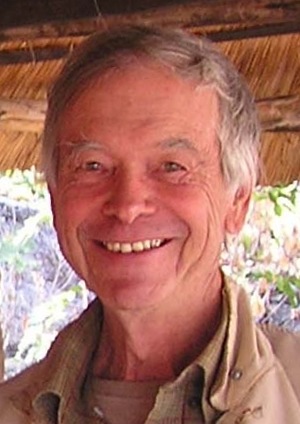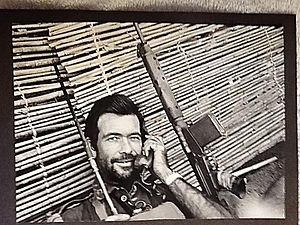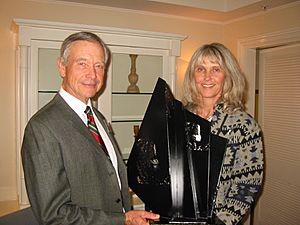Allan Savory facts for kids
Clifford Allan Redin Savory (born 15 September 1935) is a farmer and former politician from Zimbabwe. He is the president and co-founder of the Savory Institute. He created a way of managing land and animals called holistic management. This method uses a "systems thinking" approach to look at how all parts of nature work together.
Savory believes that using livestock, like cattle, in a special way can help heal the environment. He suggests moving animals in groups, much like wild herds used to move. He says this can stop land from turning into desert, a process called desertification. He thinks that healthy grasslands can even help store carbon dioxide from the air. This could help slow down climate change.
Many farmers who raise cattle like his ideas. However, some scientists disagree with him. They debate how much his methods actually help the land and how much carbon they can store.
Allan Savory received the Banksia International Award in 2003. He also won the Buckminster Fuller Challenge in 2010. Prince Charles called him "a remarkable man." Farmer Joel Salatin said Savory would be remembered as "one of the greatest ecologists of all time."
On the other hand, some people have criticized Savory's ideas. James E. McWilliams said Savory's conclusions were "scientifically questionable." George Monbiot also stated that Savory's ideas were not supported by scientific proof. However, Hunter Lovins later wrote an article in The Guardian defending Savory. She argued that grazing animals can indeed help the planet.
Contents
Allan Savory's Life Story
Early Education and Career
Allan Savory studied in South Africa at the University of Natal. He earned a degree in Biology and Botany in 1955.
His early career was very varied. He worked as a biologist, a soldier, and a public servant. He was also a member of parliament and a farmer. These different experiences helped him develop his ideas about Holistic Management.
Savory began studying why land was becoming degraded (turning into desert) in 1955. This work started in what is now Zambia and continued in Zimbabwe.
Learning About Land Degradation
Early in his career, Savory thought that too many large animals, like elephants, were harming the land. He suggested reducing their numbers. This was a common belief at the time. Later, an elephant culling program was put in place. However, this program did not stop the land from degrading as expected.
Savory later called his decision to support elephant culling "the saddest and greatest blunder of my life." This experience made him even more determined to understand why land was degrading. He realized that simply reducing animal numbers was not the answer. He believed that looking at problems in a simple, "reductionist" way was wrong for complex natural systems.
This led him to develop his "holistic" way of thinking. He wrote books about it, including Holistic Management, Third Edition and Holistic Management Handbook, Third Edition. He wrote these with his wife, Jody Butterfield, and Sam Bingham.
Savory was also influenced by a French farmer named André Voisin. Voisin believed that land was overgrazed not because there were too many animals, but because animals stayed in one place for too long. Savory agreed. He thought that moving cattle more often could prevent overgrazing.
Military and Political Experiences
Savory served in the military as a reserve officer. He learned about bush skills and tracking. These skills helped him understand the land better.
He also became involved in politics in Rhodesia (now Zimbabwe). He was elected to Parliament in 1970. He later left his political party because he disagreed with some of their policies. He tried to form a new party to bring about changes. Savory believed in strong, fair government. He wanted to improve the lives of all people in Rhodesia.
In 1979, Savory left Rhodesia due to disagreements with the government. He went into exile to continue his scientific work.
Moving to the Americas
After leaving Zimbabwe, Savory continued his work in the Americas. He taught his ideas about holistic planned grazing. This method involves carefully moving large groups of livestock to copy how wild herds used to move. This allows plants to recover fully before animals graze them again.
In 1984, Savory and his wife, Jody Butterfield, founded the Center for Holistic Management in the US. This organization later became the Savory Institute in 2009. In 1992, they also started the Africa Centre for Holistic Management in Zimbabwe. Savory donated land for this center to help people in Africa learn about holistic management.
Personal Life
When Allan Savory is not traveling, he splits his time between his home in Albuquerque and a traditional home in the African bush in Zimbabwe. He often goes barefoot.
Allan Savory's Holistic Management Ideas
Allan Savory gave a popular TED Talk in 2013 called "How to green the desert and reverse climate change." Millions of people watched it. He also wrote a book called The Grazing Revolution: A Radical Plan to Save the Earth.
In his TED Talk, Savory said that using livestock, grouped and moving, is the only way to mimic nature and heal the land. He believes this is the only tool humans have to fight desertification.
Savory supports using high technology to create clean energy. He also wants to reduce pollution. He is a strong supporter of grass fed beef. He is against industrial livestock production, where animals are kept in crowded feedlots. He believes that cows are not the enemy, but a tool that can help save humanity if managed correctly.
Savory also speaks out against slash-and-burn farming. This practice involves burning forests and grasslands. He says it harms the soil and releases a lot of carbon into the air. He points out that burning one hectare of grassland creates more pollution than 6,000 cars. He notes that a huge area of grasslands, larger than the Sahara desert, is burned in Africa every year.
See also
 In Spanish: Allan Savory para niños
In Spanish: Allan Savory para niños
- Agroecology
- Joel Salatin
- Tragedy of the commons
 | James B. Knighten |
 | Azellia White |
 | Willa Brown |




